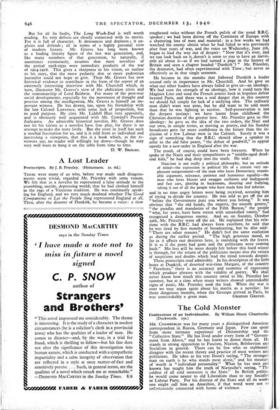A Lost Leader
Postscripts. By J. B. Priestley. (Heinemann. 2s. 6d.)
THERE were many of us who, before war made such disagree- ments seem trivial, regarded Mr. Priestley with some venom. We felt that as a novelist he represented a false attitude to the crumbling, untidy, depressing world; that he had clothed himself in the rags of a Victorian tradition. He was continually speak- ing for England, and we very much doubted whether The Good Companions or Let the People Sing represented England at all. Then, after the disaster of Dunkirk, he became a voice: a slow
roughened voice without the French polish of the usual B.B.C. speaker ; we had been driven off the Continent of Europe with a shattering loss of men and material: in a few weeks we had watched the enemy obtain what he had failed to win previously after four years of war, and the voice on Wednesday, June 5th, began to lead the way out of despair: "Now that it's over, and we can look back on it, doesn't it seem to you to have an inevit- able air about it—as if we had turned a page in the history of Britain and seen a chapter headed ' Dunkirk '? " Mr. Priestley, the dramatist, had often experimented with Time ; but never so effectively as in that single sentence.
He became in the months that followed Dunkirk a leader second only in importance to Mr. Churchill. And he gave us what our other leaders have always failed to give us—an ideology. We had seen the strength of an ideology, how it could turn the Maginot Line and send the French armies back in hopeless defeat beyond Paris, and there was a real danger that in this country we should fail simply for lack of a unifying idea. The ordinary man didn't want war aims, but he did want to be told more than that he was fighting to survive. Self-preservation is not the deepest instinct: we have learnt from childhood the Christian doctrine of the greater love. Mr. Priestley gave us this ideology: he gave us the idea of the two orders, the Nazi and our own, in simple terms, as moving as poetry, and his Sunday broadcasts gave far more confidence in the future than the in- clusion of a few Labour men in the Cabinet. Surely it was a sign of something that the B.B:C. should allow a speaker to refer to the old false peace, "the defeat of goodwill," to appeal openly for a new order in England after the war.
The result, of course, could have been foreseen. When he spoke of the Nazis and their sympathisers as "middle-aged dead- end kids," he had dug deep into the truth. He said:
Nazi-ism is not really a political philosophy, but an attitude of mind—the expression in political life of a certain very un- pleasant temperament—of the man who hates Democracy, reason- able argument, tolerance, patience and humorous equality—the man who loves bluster and swagger uniforms and bodyguards and fast cars, plotting in baclu-ooms, shouting and bullying, taking it out of all the people who have made him feel inferior.
and in no time angry letters were being received, accusing him of trying to divide the country. He was told to get off the air "before the Government puts you where you belong." It was obvious that "the old hands, the experts, the smooth gentry," "the pundits and mandarins of the Fifth Button," the people "who, for years, have been rotten with unsatisfied vanity," had recognised a dangerous enemy. And so, on Sunday, October 20th, Mr. Priestley went off the air. He explained that his rela- tions with the B.B.C. had always been excellent, he said that he was tired by five months of broadcasting, but he also said : "There are other reasons." He didn't feel the same exaltation as during the earlier period. "The high generous mood, so far as it affects our destinies here, is vanishing with the leaves. It is as if the poets had gone and the politicians were coming back." His loss will be more deeply felt before this hard winter is through, for the return of the politicians means also the return of suspicions and doubts which lead the mind towards despair. These postscripts read admirably. In his description of the little boats at Dunkirk, of deserted war-time Margate, of the country " Parashots," there is an accuracy and economy of expression which produce phrases with the validity of poetry. We shall never know how much this country owed to Mr. Priestley last summer, but at a time when many writers showed unmistakable signs of panic, Mr. Priestley took the lead. When the war is over we may argue again about his merits as a novelist : for those dangerous months, when the Gestapo arrived in Paris, he
was unmistakably a great man. GRAHAM GREENE.










































 Previous page
Previous page